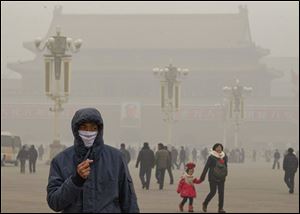
EDITORIAL
Study underscores pollution's impact on the mind
9/8/2018
Air pollution may be poisoning the brain even as it wracks the body. That’s the conclusion of a U.S.-Chinese study published this week in the Proceedings of the National Academy of Sciences — and it’s a big incentive for many parts of the country, including Toledo, to double down on polluters.
The study, involving 25,000 Chinese citizens, associated long-term exposure to air pollution with diminished cognitive skills. While cognitive shortfalls are a quality of life issue, even a personal safety issue for some, the picture gets a lot darker when one considers that these shortfalls also are associated with the onset of Alzheimer’s disease and other forms of dementia.

A study of 25,000 Chinese citizens associated long-term exposure to air pollution with diminished cognitive skills.
The study’s large scale gives heft to alarms raised by other experts.
As far back as 2011, researchers at Ohio State University reported that mice exposed to particulate matter displayed symptoms of depression and fall-offs in spacial learning and memory. In 2012, a study led by a researcher at Rush University Medical Center in Chicago found that pollution seemed to speed cognitive decline in women. And last year, a multi-disciplinary team at the University of Southern California reported that air pollution elevated women’s risk of developing dementia.
This is on top of the better established links between air pollution and asthma, heart disease, and lung cancer.
Those especially vulnerable to pollution, such as children and the elderly, should stay indoors on high-pollution days. But the findings also give activists more ammunition in their fight for tougher laws and stronger enforcement, provide regulators with more reason to do their jobs effectively, and give image-conscious cities an additional reason to campaign for clean air.
Long after most of the steel mills have gone silent, Pittsburgh continues to struggle with poor air quality, and some have demanded that local health departments up their game.
The issue must be on the front burner here. Toledo aims to revitalize and grow by attracting some of the nation’s best minds. It makes no sense to let pollution damage them.